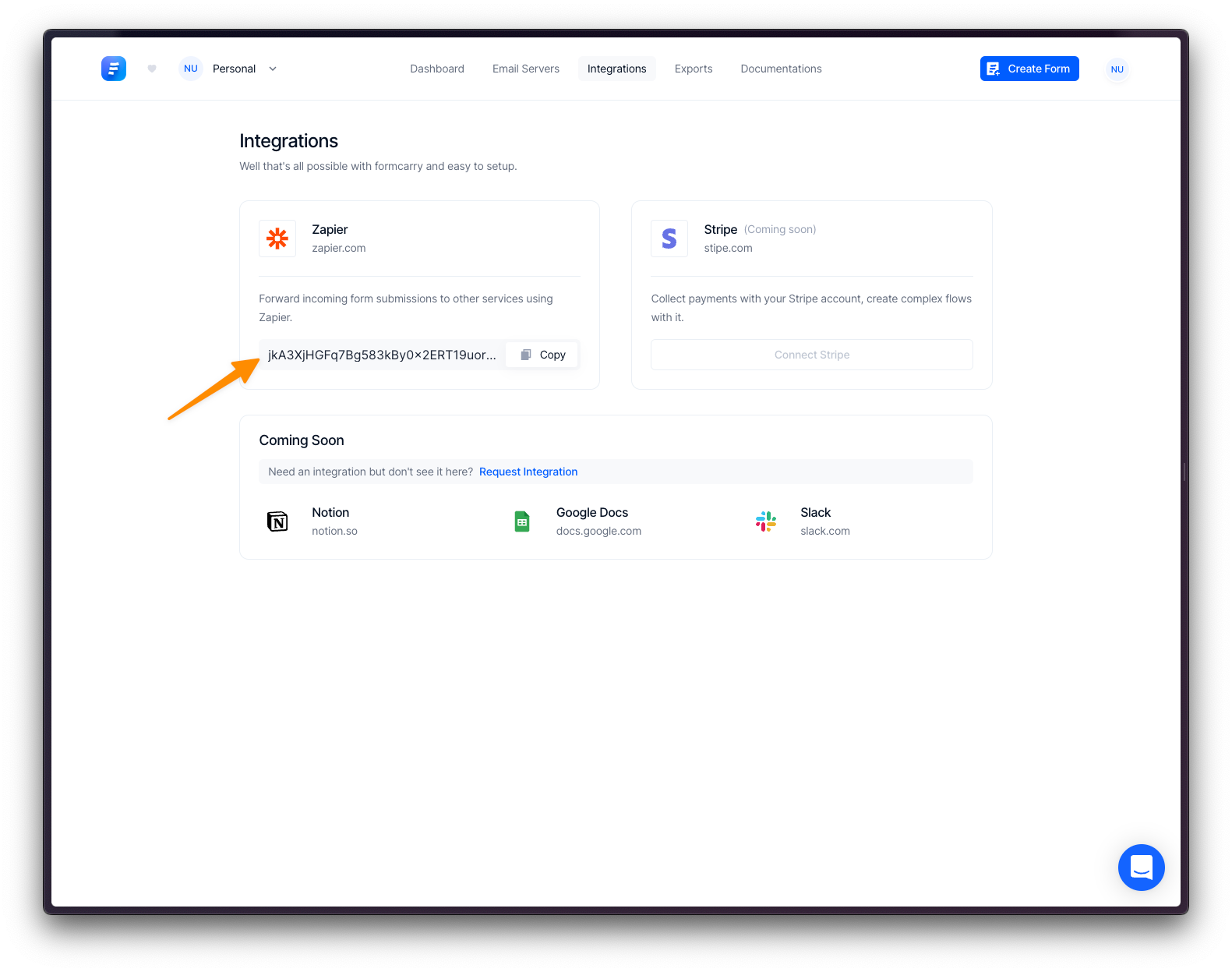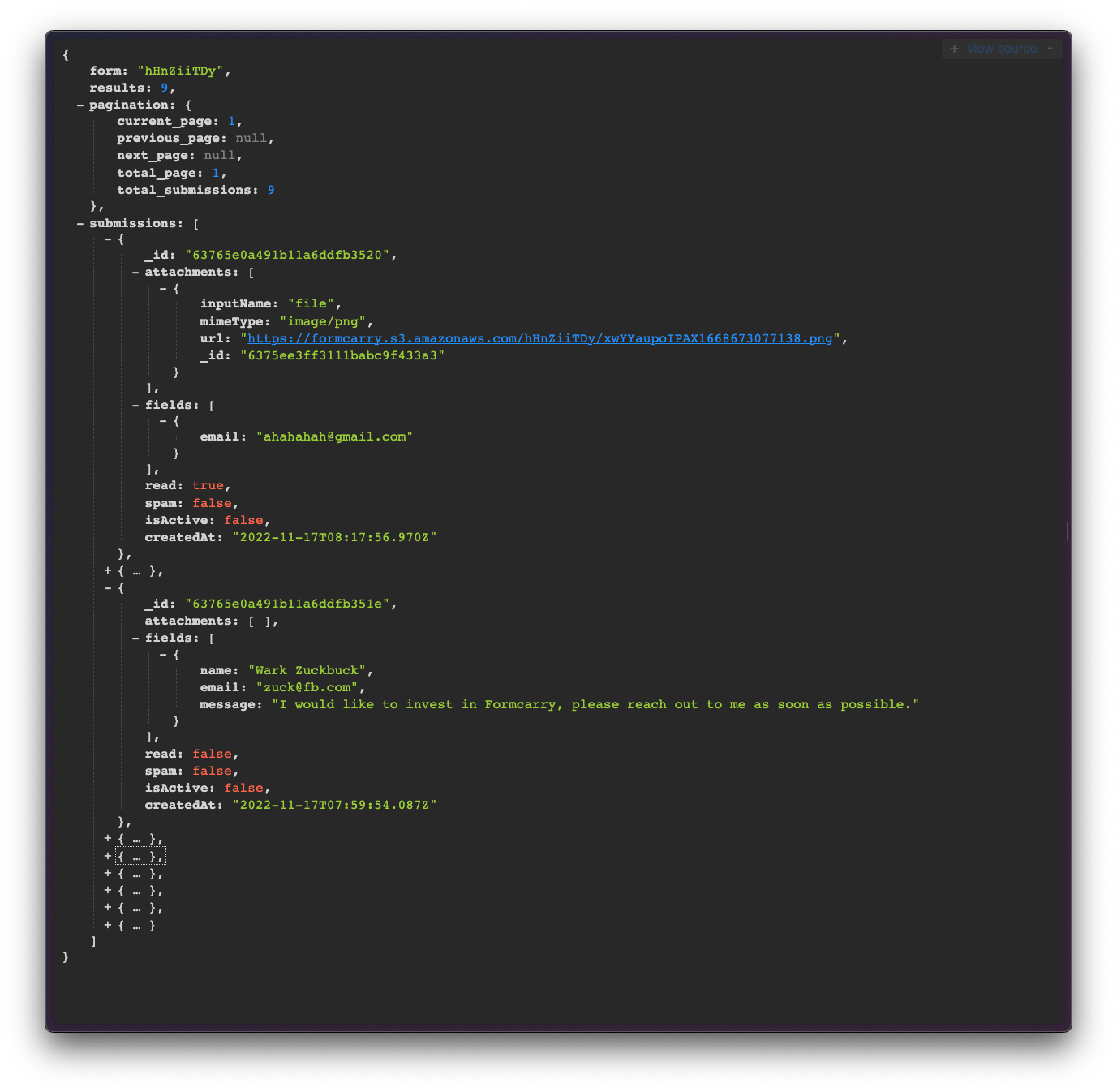In this section, we will discuss the Form Submissions API, which allows you to retrieve a list of submissions for a specific form. This API supports pagination, filtering, and sorting options to help you fetch the data you need.
Base URL
The base URL for the Form Submissions API is
https://formcarry.com/api/formAuthorization
Internal API works pretty easy to begin with, every team has an API key that can be found under Integrations.

Copy this key first, you are going to use it for authorization along the way.
Example Authorization:
Please pass your api_key in request header at every request you made to the API
With curl:
shellcurl -H "api_key: YOUR_API_KEY" https://formcarry.com/api/auth
With Javascript:
javascript// Create an object to store the request headers var headers = { "api_key": "Change With Your API Key" }; // Use the fetch API to send a request with the specified headers fetch("https://formcarry.com/api/auth", { headers: headers }) .then(function (response) { // Print the response to the console console.log(response); }) .catch(function (error) { // Print any error that occurred console.error(error); });
Example Response:
json{ "status":"success", "message":"You are successfully authenticated, please pass your api_key in every requests header." }
Retrieve Form Submissions
Use the following endpoint to retrieve form submissions:
jsonGET https://formcarry.com/api/form/:formid/submissions
Path Parameters
formid: Required. The unique identifier for the form whose submissions you want to retrieve.
Query Parameters
limit: Optional. The number of submissions to return per page. Default is 25, and the maximum value is 50.
page: Optional. The page number to return. Default is 1.
sort: Optional. The sorting criteria for the submissions. Use the formatfield:order, wherefieldis the field to sort by andorderis either 1 (ascending) or -1 (descending). By default, submissions are sorted bycreatedAtin descending order.
filter: Optional. Apply filters to the submissions using thefilterquery parameter. Filters should be in the formatkey:value, and multiple filters can be separated by commas.
Available filters:
date: Filter submissions by the number of days ago. For example,date:7filters submissions created within the last 7 days.
attachments: Filter submissions based on whether they have attachments or not. Usetruefor submissions with attachments andfalsefor submissions without attachments.
spam: Filter submissions based on whether they are marked as spam or not. Usetruefor spam submissions andfalsefor non-spam submissions.
- Custom filters for dynamic fields: Filter submissions based on specific field values. Use the format
fieldname_contains:valueto include submissions containing the value, andfieldname_notcontains:valueto exclude submissions containing the value.
Note: Filtering by dynamic fields can be vulnerable to user input, so it's important to properly sanitize and validate the input to prevent potential security issues.
Response
The response is a JSON object containing the following properties:
form: The unique identifier of the form whose submissions were requested.
results: The number of submissions returned in the current response.
pagination: An object containing pagination details.current_page: The current page number.previous_page: The previous page number, ornullif there is no previous page.next_page: The next page number, ornullif there is no next page.total_page: The total number of pages.total_submissions: The total number of submissions for the form.
submissions: An array of submission objects. Each object contains the following properties:_id: The unique identifier of the submission.form: The unique identifier of the form the submission is associated with.createdAt: The timestamp when the submission was created.updatedAt: The timestamp when the submission was last updated.fields: An array of objects containing the field values for the submission. Each object includes

